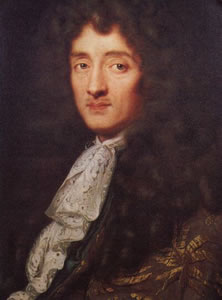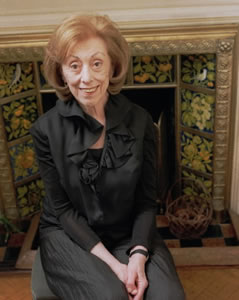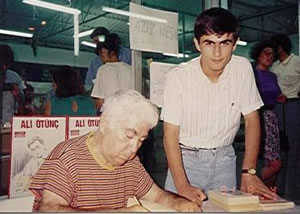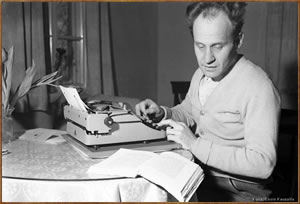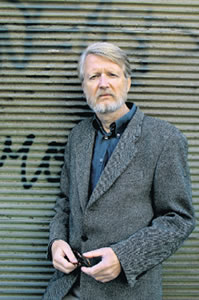De Franse schrijver en filosoof Julien Benda werd geboren op 26 december 1867 in Parijs. Zie ook mijn blog van 26 december 2006 en ook mijn blog van 26 december 2008.
Uit: The Treason of the Intellectuals (Vertaald door Richard Aldington)
„TO SUM UP: If I look at contemporary humanity from the point of view of its moral state as revealed by its political life, I see (a) A mass in whom realist passions in its two chief forms—class passion, national passion—has attained a degree of consciousness and organization hitherto unknown; (b) A body of men who used to be in opposition to the realism of the masses, but who now, not only do not oppose it, but adopt it, proclaim its grandeur and morality; in short, a humanity which has abandoned itself to realism with a unanimity, an absence of reserve, a sanctification of its passion unexampled in history.
This remark may be put in another form. Imagine an observer of the twelfth century taking a bird’s-eye view of the Europe of his time. He would see men groping in the obscurity of their minds and striving to form themselves into nations (to mention only the most striking aspect of the realist will); he would see them beginning to succeed; he would see groups of men attaining consistency, determined to seize a portion of the earth and tending to feel conscious of themselves as distinct from the groups surrounding them. But at the same time he would see a whole class of men, regarded with the greatest reverence, laboring to thwart this movement. He would see men of learning, artists and philosophers, displaying to the world a spirit which cared nothing for nations, using a universal language among themselves. He would see those who gave Europe its moral values preaching the cult of the human, or at least of the Christian, and not of the national, he would see them striving to found, in opposition to the nations, a great universal empire on spiritual foundations. And so he might say to himself: “Which of these two currents will triumph? Will humanity be national or spiritual? Will it depend on the will of the laymen or of the “clerks”? And for long ages the realist cause will not be completely victorious; the spiritual body will remain faithful to itself long enough to our observer to be uncertain of the result. To-day the game is over. Humanity is national. The layman has won. But his triumph has gone beyond anything he could have expected. The “clerk” is not only conquered, he is assimilated.“

Julien Benda (26 december 1867 – 7 juni 1956)
De Zwitserse dichter en schrijver Alfred Huggenberger werd geboren op 26 december 1867 in Bewangen nabij Bertschikon. Op 29-jarige leeftijd nam hij de boerderij van zijn ouders over, maar deze brandde in 1904 door brandstichting af. In 19078 brak hij als schrijver door met zijn roman Hinterm Pflug. Zijn oeuvre omvat meer dan honderd boeken, toneelstukken en dichtbundels., zowel in Hoogduits als in Zwitserduits.
Ein neues Jahr
Mancher Tag steigt hell empor,
Will mir nichts als Liebes zeigen;
Zieht er heim durchs goldneTor,
Muss mein Mund in Sorgen schweigen.
Mancher Morgen trägt als Kleid
Schwere, dunkle Nebelschwaden –
Sieh! Ein Wind verweht das Leid,
Und ein Abend winkt voll Gnaden.
Also kann das junge Jahr,
Dem wir bang ins Auge schauen,
In ein neues Land uns gar
Lächelnd eine Brücke bauen.
Gross und niegeahnt Geschehn
Kann sein Schoss verschwiegen bergen,
Und derweil wir zagend stehn,
Steigt das Glück schon von den Bergen.

Alfred Huggenberger (26 december 1867 – 14 februari 1960)
De Franse schrijver René Bazin werd geboren p 26 december 1853 in Angers. Hij schreef meer dan veerig roma
ns, verhalen en reisverslagen. Veel van zijn werk bereikte hoge oplages en werd in vele talen vertaald. Zijn gedachtegoed getuigde van een traditioneel, met de aarde verbonden, katholicisme. In 1903 werd hij lid van de Académie française.
Uit: Les Noëllet
„Elle suivait la chasse, non pas immédiatement derrière les chiens, mais à quelque cent mètres à gauche, obstinée dans cette direction parallèle, toujours au même trot allongé, sans un temps de galop. Pendant plus d’une heure, employée à relever un défaut, la Roussette et son cavalier avaient disparu. Ils venaient de réapparaître tout à coup, au milieu d’une taille, au moment où l’animal de chasse, un brocard, enfin relancé, filait droit pour gagner la lisière de la foret de Leppo et de là débucher vers celle de la Foucaudière. Le gros des chasseurs fut bientôt égaré, fourbu ou distancé, et deux personnes seulement continuèrent à galoper derrière les chiens : le piqueur Leproux, tout rond sur sa jument maigre, la bouche en cœur et la joue enflée, prêt à sonner de la trompe, et la plus avenante, la plus enragée des chasseresses, Madeleine Laubriet. Elle était ravissante dans son amazone courte, ses cheveux bruns tordus sous le petit chapeau de soie, le regard animé, la joue rose, toute au plaisir de la course et de la poursuite. C’en est un si grand de courir ainsi, rapide, à travers le vent qui cingle le visage, de se sentir emporté par une force intelligente, obéissante, dont une pression du doigt change l’allure ou la route ! Un flot de sensations fortes, l’orgueil d’être maître, l’ivresse de l’espace, une sorte de volupté du danger, la passion primitive du sang, cette vieille férocité que nous retenons d’ordinaire, nous remuent âprement. Et comme l’air emplit joyeusement la poitrine ! Comme il va l’équipage de la Landehue ! C’est une vision qui passe, c’est une fanfare de voix qui court. Toute la forêt est en éveil. Madeleine Laubriet s’amuse royalement. Elle est chasseresse de race. Le vieux piqueur, qui la couve du regard, multiplie pour elle ses bien aller. Et les notes s’éparpillent, sonores, à travers les bois mouillés, jetant une épouvante de plus au cœur du chevreuil, pauvre bête effarée, qui risque un dernier effort pour la vie, et débuche en plaine.“

René Bazin (26 december 1853 – 19 juli 1932)
De Franse schrijver, polemist en journalist Jean Galtier-Boissière werd geboren op 26 december 1891 in Parijs. Hij diende tijdens WO I in het leger en was vanuit de loopgraven oprichter van het journaal Le Crapouillot. Later schreef hij veel voor Le Canard enchaîné..
Uit: L’humour des français sous l’occupation, histoires et anecdotes
„Sur le quai du métro un officier allemand aborde brusquement une jeune femme en lui disant :
– Vous êtes bien anglaise, n’est-ce pas, Madame? Terrifiée, elle répond en balbutiant :
– Mais… je… enfin, c’est-à-dire… oui Monsieur.
– Voulez-vous m’indiquer la correspondance pour la station Beaugrenelle?
Elle donne le renseignement; il remercie et salue.
Les Anglaises sont aussi filles d’Eve ; sa curiosité est si fortement piquée qu’elle se décide à lui dire :
– Mais pourquoi m’avez-vous demandé si j’étais anglaise?
– Parce que les femmes françaises me font toujours trotter
dans tous les corridors, en m’indiquant la direction diamétralement opposée!
Hitler téléphone à Mussolini :
– Êtes-vous à Athènes?…
– Pardon, je n’entends pas bien.
– Je vous demande si vos troupes sont à Athènes?
– Je vous entends très mal, mon cher Adolf, sans doute téléphonez-vous de très loin… de Londres probablement!“

Jean Galtier-Boissière (26 december 1891 – 22 januari 1966)
Boekomslag (Geen portret beschikbaar)
De Engelse dichter en geleerde Thomas Gray werd geboren op 26 december 1716 in Londen. Zie ook mijn blog van 26 december 2006 en ook mijn blog van 26 december 2008.
Ode On The Spring
Lo! where the rosy-bosom’d Hours,
Fair Venus’ train appear,
Disclose the long-expecting flowers,
And wake the purple year!
The Attic warbler pours her throat,
Responsive to the cuckoo’s note,
The untaught harmony of spring:
While whisp’ring pleasure as they fly,
Cool zephyrs thro’ the clear blue sky
Their gather’d fragrance fling.
Where’er the oak’s thick branches stretch
A broader, browner shade;
Where’er the rude and moss-grown beech
O’er-canopies the glade,
Beside some water’s rushy brink
With me the Muse shall sit, and think
(At ease reclin’d in rustic state)
How vain the ardour of the crowd,
How low, how little are the proud,
How indigent the great!
Still is the toiling hand of Care:
The panting herds repose:
Yet hark, how thro’ the peopled air
The busy murmur glows!
The insect youth are on the wing,
Eager to taste the honied spring,
And float amid the liquid noon:
Some lightly o’er the current skim,
Some show their gaily-gilded trim
Quick-glancing to the sun.
To Contemplation’s sober eye
Such is the race of man:
And they that creep, and they that fly,
Shall end where they began.
Alike the busy and the gay
But flutter thro’ life’s little day,
In fortune’s varying colours drest:
Brush’d by the hand of rough Mischance,
Or chill’d by age, their airy dance
They leave, in dust to rest.
Methinks I hear in accents low
The sportive kind reply:
Poor moralist! and what art thou?
A solitary fly!
Thy joys no glitt’ring female meets,
No hive hast thou of hoarded sweets,
No painted plumage to display:
On hasty wings thy youth is flown;
Thy sun is set, thy spring is gone–
We frolic, while ’tis May.

Thomas Gray (26 december 1716 – 30 juli 1771)
De Duitse dichter en schrijver Ernst Moritz Arndt werd op 26 december 1769 in Groß-Schoritz geboren als zoon van een voormalige lijfeigene op het eiland Rügen. Hij studeerde geschiedenis en theologie. In 1905 werd hij hoogleraar in Greifswald. Wegens zijn pampflet tegen Napoleon “Geist der Zeit” moest hij naar Stockholm vluchten. In 1812 ging hij als secretaris in het gevolg van Freiherr vom Stein naar Sint Petersburg.
Ballade
Und die Sonne machte den weiten Ritt
Um die Welt,
Und die Sternlein sprachen: “Wir reisen mit
Um die Welt”;
Und die Sonne, sie schalt sie: “Ihr bleibt zu Haus!
Den ich brenn euch die goldnen Äuglein aus
Bei dem feurigen Ritt um die Welt.”
Und die Sternlein gingen zum lieben Mond
In der Nacht,
Und sie sprachen: “Du, der auf Wolken trohnt
In der Nacht,
Laß uns wandeln mit dir, denn dein milder Schein,
Er verbrennet uns nimmer die Äugelein.”
Und er nahm sie, Gesellen der Nacht.
Nun willkommen, Sternlein und lieber Mond,
In der Nacht!
Ihr versteht, was still in dem Herzen wohnt
In der Nacht.
Kommt und zündet die himmlische
n Lichter an,
Daß ich lustig mit schwärmen und spielen kann
In den freundlichen Spielen der Nacht.

Ernst Moritz Arndt (26 december 1769 – 29 januari 1860)
De Zwitserse dichter en schrijver Freiherr Johann Gaudenz von Salis-Seewis werd geboren op 26 december 1762 op slot Bothmar bei Malans. Tussen 1779 en 1789 was hij officier bij de Zwitserse Garde van de Franse koning. In 1789 / 90 ondernam hij een reis door de Nederlanden en door Duitsland. Hij maakte kennis met Goethe, Wieland, Herder, Schiller en Matthison. Vanaf 1793 leefde hij weer in Zwitserland waar hij zowel in het leger als in de staat allerlei hoge posities bekleedde.
Winterlied
Das Feld ist weiß, so blank und rein,
Vergoldet von der Sonne Schein,
Die blaue Luft ist stille;
Hell, wie Kristall
Blinkt überall
Der Fluren Silberhülle.
Der Lichtstrahl spaltet sich im Eis,
Er flimmert blau und rot und weiß,
Und wechselt seine Farbe.
Aus Schnee heraus
Ragt, nackt und kraus,
Des Dorngebüsches Garbe.
Von Reifenduft befiedert sind
Die Zweige rings, die sanfte Wind’
Im Sonnenstrahl bewegen.
Dort stäubt vom Baum
Der Flocken Pflaum
Wie leichter Blütenregen.
Tief sinkt der braune Tannenast
Und drohet, mit des Schnees Last
Den Wandrer zu beschütten;
Vom Frost der Nacht
Gehärtet, kracht
Der Weg, von seinen Tritten.
Das Bächlein schleicht, von Eis geengt;
Voll lautrer blauer Zacken hängt
Das Dach; es stockt die Quelle;
Im Sturze harrt,
Zu Glas erstarrt,
Des Wasserfalles Welle.
Die blaue Meise piepet laut;
Der muntre Sperling pickt vertraut
Die Körner vor der Scheune.
Der Zeisig hüpft
Vergnügt und schlüpft
Durch blätterlose Haine.
Wohlan! auf festgediegner Bahn,
Klimm ich den Hügel schnell hinan,
Und blicke froh ins Weite;
Und preise den,
Der rings so schön
Die Silberflocken streute.

Johann Gaudenz von Salis-Seewis (26 december 1762 – 29 januari 1834)
De Amerikaanse schrijfster Emma Dorothy Eliza Nevitte Southworth werd geboren op 26 december 1819 in Washington, D.C. Gedurende de tweede helft van de 19e eeuw was zij de meest gelezen Amerikaanse schrijfster. Zij begon met schrijven in 1844 om in haar eigen onderhoud en dat van haar kinderen te voorzien nadat haar man haar na vier jaar huwelijk verlaten had. Haar meer dan zestig romans verschenen eerst in Robert Bonner’s populaire krant The New York Ledger, die een miljoenen-publiek bereikte.
Uit: Ishmael or In The Depths
„No! it was too late; affairs had gone too far; they must now take their course; the foolish girl’s fate must be on her own head, and on that of her careless elder sister; they would both be ruined, that was certain; no respectable family would ever employ either of them again ; they would starve; well, so much the better; they would be a warning to other girls of their class, not to throw out their nets to catch gentlemen! Herman had been foolish, wicked even, but then young men will be young men; and then, again, of course it was that artful creature’s fault! What could she, his mother, do in the premises ? Not speak to her son upon the subject, certainly ; not even let him know that she was cognizant of the affair ! What then ? She was going away with her daughters in a day or two! And, good gracious, he would be left alone in the house! to do as he pleased! to keep bachelor’s hall! to bring that girl there as his housekeeper, perhaps, and so desecrate his sacred, patrimonial home! No, that must never be! She must invite and urge her son to accompany herself and his sisters to Washington, But if he should decline the invitation and persist in his declination, what then ? Why, as a last resort, she would give up the Washington campaign…“

E. D. E. N. Southworth (26 december 1819 – 30 juni 1899)
De Franse dichter, schrijver en filosoof Jean-François de Saint-Lambert werd geboren op 26 december 1716 in Nancy. In 1750 verliet hij het hof van Stanislaus I. Leszczyński in Lunéville, waar hij hoofd van de garde geweest was en ging naar Parijs. Daar kwam hij in contact met de literaire salons en leerde hij Mme d’Épinay, Rousseau, Grimm, Diderot en Holbach kennen. Zijn grootste succes werd Les saisons (1770), een lang gedicht over natuur en landleven.
L’automne
Ô vous qu’ont enrichis les trésors de Cérès,
Préparez-vous, mortels, à de nouveaux bienfaits.
Redoublez vos présents, terre heureuse et féconde ;
Récompensez encor la main qui vous seconde.
Et toi, riant automne, accorde à nos désirs
Ce qu’on attend de toi, du repos, des plaisirs,
Une douce chaleur, et des jours sans orages.
Il vient environné de paisibles nuages,
Il voit du haut du ciel le pourpre des raisins,
Et l’ambre
et l’incarnat des fruits de nos jardins.
De coteaux en coteaux la vendange annoncée
Rappelle le tumulte et la joie insensée ;
J’entends de loin les cris du peuple fortuné
Qui court, le thyrse en main, de pampres couronné.
Favoris de Bacchus, ministres de Pomone,
Célébrez avec moi les charmes de l’automne :
L’année à son déclin recouvre sa beauté.
L’automne a des couleurs qui manquaient à l’été.
Dans ces champs variés, l’or, le pourpre et l’opale,
Sur un fond vert encor brillent par intervalle,
Et couvrent la forêt, qui borde ces vallons,
D’un vaste amphithéâtre étendu sur les monts.
L’arbre de Cérasonte au gazon des prairies
Oppose l’incarnat de ses branches flétries.
Quelles riches couleurs, quels fruits délicieux
Ces champs et ces vergers présentent à vos yeux !
Voyez par les zéphyrs la pomme balancée
Échapper mollement à la branche affaissée,
Le poirier en buisson, courbé sous son trésor,
Sur le gazon jauni rouler les globes d’or,
Et de ces lambris verts attachés au treillage
La pêche succulente entraîner le branchage.
Les voilà donc, ces fruits qu’ont annoncés les fleurs
Et que l’été brûlant mûrit par ses chaleurs !
Jouissez, ô mortels, et, par des cris de joie,
Rendez grâces au ciel des biens qu’il vous envoie ;
Que la danse et les chants, les jeux et les amours,
Signalent à la fois les derniers des beaux jours.

Jean-François de Saint-Lambert (26 december 1716 – 9 februari 1803)








































